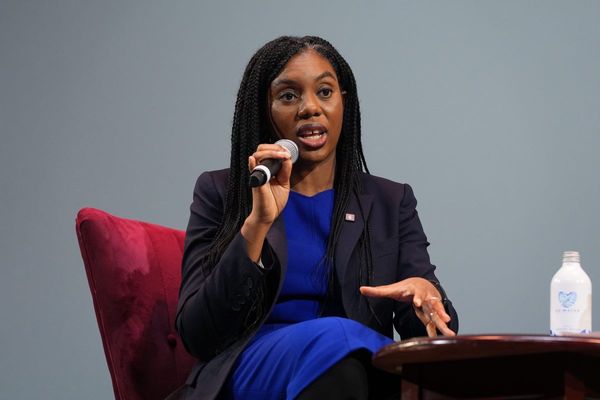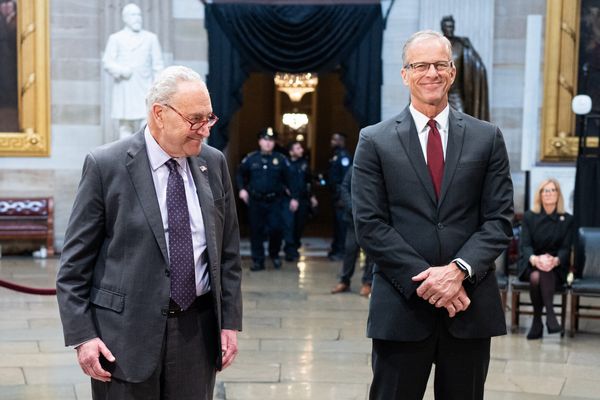
Rishi Sunak has staked his political credibility on pushing through emergency legislation to resurrect his high-profile plan to deport asylum seekers to Rwanda, after the supreme court ruled it was unlawful.
During a combative press conference on Wednesday afternoon, hastily arranged after the five judges unanimously rejected the proposal, Sunak said legislation would end the “merry-go-round” of legal challenges by setting out in law that the east African country is safe.
Amid increasing pressure from the right of the Conservative party to commit to withdrawing from the European convention on human rights (ECHR), Sunak said he would “not allow a foreign court to block these flights”, but declined to say how.
“I am prepared to do what is necessary to get flights off. I will not take the easy way out,” the prime minister said, standing at a lectern bearing the “stop the boats” slogan.
A parallel plan for a new international treaty with Rwanda would provide “guarantees in law” that people deported from the UK would not be returned to their home countries, he added.
While a treaty would formalise the previous memorandum of understanding with Rwanda, Whitehall sources said this could take more than a year and then be challenged in the courts.
The supreme court’s judgment, read out by Lord Reed, its president, said all five judges agreed with the court of appeal that there was a real risk of asylum claims being wrongly determined in Rwanda, resulting in people being wrongly returned to their country of origin and facing persecution.
He pointed to evidence from the United Nations’ refugee agency, the UNHCR, which highlighted the failure of a similar deportation agreement between Israel and Rwanda.
There was, the ruling concluded, “substantial grounds for believing that the removal of the claimants to Rwanda would expose them to a real risk of ill-treatment”.
While some Tory MPs railed against the decision – Lee Anderson, the Conservative party’s vice-chair, said Sunak should “ignore the laws and send them straight back” – the PM said accepted and respected the ruling but would try to find a way around it.
Sunak’s desire to rapidly enact legislation could hit trouble if his plan is opposed in the Lords, which seems likely. On Wednesday night, the Liberal Democrats said Sunak had simply “doubled down on failure”.
The Bar Council also warned that passing a law to reverse such a ruling “would raise profound and important questions about the respective role of the courts and parliament”.
Sunak did not say when the legislation might be introduced, or how it would get around the supreme court’s view that the Rwanda plan contravened three existing UK laws.
It was notable that in Sunak’s press conference, while he said the government was “working extremely hard” to meet its timetable of the first flights leaving in spring, he declined three times to guarantee this would happen even before the next election.
Further delay is likely to enrage Conservative MPs on the right of the party, who are strongly pushing for ministers to enact legislative blocks on the ECHR and UN Refugee Convention in UK law – a move that would in turn alarm centrist Tories and have implications for the Northern Ireland peace process.
Shortly after the press conference, the New Conservatives group, a populist-leaning Tory faction co-led by backbenchers Miriam Cates and Danny Kruger, said such a bill “must come to parliament within weeks, and must have everything in it to ensure that flights are in the air within months”.
There was an even more scathing response from allies of Suella Braverman, who was sacked as home secretary by Sunak on Monday after a series of controversies, and who had joined calls from some Tory backbenchers for emergency legislation.
“This is a treaty which he’s putting into legislation – it’s just another version of plan A. He’ll be stuck in the courts again. More magic tricks from Rishi’s magical thinking,” one ally of Braverman said.
A former minister said the treaty “will be stuck in the courts while we are being voted out of office” and described the emergency legislation as “sleight of hand”, adding: “Sunak has given up on Conservatism and is instead relying on David Cameron to get us through this year. It cannot go on like this.”
Sunak will hope that the notably pugnacious tone he struck at the press conference will allay such fears in other MPs. Asked if he endorsed Anderson’s call to simply ignore the ruling, he said such comments “reflect the strength the feeling in the country”.
“My patience has run thin, as I do believe the country’s patience has run thin,” Sunak said. “That’s why we will take all the necessary steps to ensure that we can remove any further blockages to us getting this policy executed, and getting planes leaving as planned in the spring of next year.”
He stopped short of promising to quit the ECHR, saying he would instead “revisit those international relationships to remove the obstacles in our way” and highlighted the fact that other countries, including Italy, are looking to introduce similar measures to deport people to third countries.
Some Tory MPs have called for a complete rethink of the Rwanda plan to focus instead on other ways to stop small boats crossing the Channel.
Natalie Elphicke, whose Dover constituency sees the bulk of such arrivals, told Times Radio: “I think that the supreme court’s decision today is very clear and we need to move forward from the Rwanda focus.
“And the court was clear that the sorts of outsourcing agreements that the UK might want to enter into, that other countries enter into, in principle can be progressed. But what we need to see is a real focus, particularly on the immediate risk of people smugglers being emboldened in these winter months.”
Speaking in the Commons, James Cleverly, the new home secretary, damped down the idea of leaving the ECHR.
Yvette Cooper, the shadow home secretary, suggested Cleverly had previously privately referred to the Rwanda plan as “batshit”, a jibe not explicitly denied by Cleverly.







